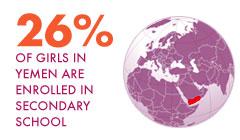
September 23, 2011 | Politics and Leadership
No More Excuses
We know how to empower women and girls - so what are we waiting for?
By Anna Louie Sussman
You’re on your way to your mother’s 70th birthday party, when your car breaks down. You can tell what went wrong under the hood, you have the tools in the trunk, and you know how to do the repairs. All that’s left to do is fix it.
In other words, there’s no excuse not to be there when Mom blows out the candles.
That was the message on which the world’s leading development experts, politicians and cultural luminaries converged yesterday at the Clinton Global Initiative’s day of programming devoted to women and girls. There are no more excuses: we know that investing in women is critical, and we know effective ways to do it.
The very first commitment of the day came from Newsweek & The Daily Beast’s Tina Brown, who announced the launch of the Women in the World Foundation and website, dedicating to supporting and highlighting “the innovative work being done around the world to transform the lives of women and girls.”
This year, there were 61 new commitments to women and girls making up 31.4% of the total, the largest proportion of commitments so far. Since 2005, 395 commitments to girls and women have been made, with a combined estimated portfolio value of $7.4 billion. The World Bank announced its commitment to gender mainstreaming across its work. Studies show that more women on corporate boards translates to higher profits. Smart money is on women.
But as Melanne Verveer, U.S. Ambassador-at-Large for global women’s issues, noted in her introduction, formidable challenges remain. For example, in sub-Saharan Africa, women and girls spend 40 billion hours per year gathering water, the equivalent of a year’s labor by France’s entire workforce.
The time has come for “focusing on interventions that have shown measurable results, and looking at how we as a community can scale those efforts,” said Verveer. “In other words, scaling what works.”
At the opening panel on engaging men and boys as allies, Executive Director of UN Women and former Chilean President Michelle Bachelet, asked Gary Barker, International Director of the Brazilian non-profit Promundo, how to sell men on the idea that empowering women did not come at men’s expense.
At first, he acknowledged, it’s not an easy sell: men want to know what’s in it for them. But as their wives become equal partners inside and outside of the home, their relationships and marriages improve.
“They tell me, ‘If I try this gender equality thing, my life gets better. My sex life gets better, my marriage is more equal, I have a better relationship with my kids,” he said.
At a breakout session on girls, women and water, Betty Kyazike, a small-scale entrepreneur from Uganda whose employer, Living Goods, recruits women to sell health-oriented products such as malaria nets and water purification products door-to-door. By establishing a sustainable distribution network, the company’s model is easily scalable and has been franchised across Uganda.
Neil Bellefeuille of the Paradigm Project, a limited-liability company which distributes $42 clean cook stoves to rural families, said that charging a small fee for his product opened up a feedback loop that helped him improve the product for his customers, like when they requested longer cables for the solar panels that help power the stove.
“If you pay for something, retailers have something to gain for making sure you’re a happy customer,” he said. People given handouts, he argued, don’t feel empowered to criticize.
The powerful effects of seeing social business in action cut both ways. Angel Cabrera of the Thunderbird School of Global Management described how his MBA students are “transformed” by trips to Indonesia and Ghana in which they work with non-profits that supply technology and enhance the farming and market capacity of rural women.
“They see how business becomes a motor that constructs a whole society,” he said.
Gary M. Cohen, President of BD Medical Systems, described how HIV/AIDS in Africa, where young girls are three times more likely than boys to be infected, is a “linchpin” that tied together six out of the eight Millenium Development Goals.
“We’re not going to make progress on these problems unless we deal with the underlying the social and behavioral problems: the way girls are treated in society.”
“You can sit here and say I don’t believe that girls should be violated,” he continued. “But it’s not enough to sit back and philosophically disagree with this. You have to get involved.”
Anna Louie Sussman is a writer and editor for the Women in the World Foundation website, and a frequent contributor to major U.S. magazines and newspapers